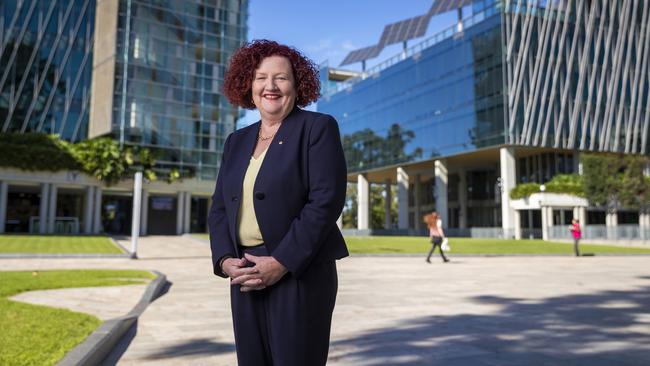QUT VC warns of decline in basic research
QUT vice-chancellor Margaret Sheil has warned the rush towards applied research ignores the need for pure research.

Queensland University of Technology vice-chancellor Margaret Sheil has warned that Australia’s rush towards applied research that has clear economic benefits is ignoring the need for pure research.
“Today, unfortunately, basic discovery research is undervalued and the appetite to fund it in decline, and we see a major turn towards applied research producing a substantial imbalance in the system,” Professor Sheil writes in the latest edition of Universities Australia newsletter Higher Ed.ition.
She points to figures showing that, from 1992 to 2016, the proportion of applied research in Australian universities grew from 30 per cent to 49 per cent.
In the same period the proportion of basic research fell from 40 per cent to 23 per cent.
And an in-between category, termed “strategic basic research” — which Professor Sheil described as basic research with a mission — declined from 24 per cent to 19 per cent.
She said that an example of strategic basic research would be a cure for Alzheimer’s disease, which might require applied research into new drug therapies as well as basic research to get a better understanding of the brain.
Professor Sheil also pointed out that the basic research at the famous Cavendish Laboratory at Cambridge, which discovered the electron and the neutron and investigated X-rays, paved the way for the development of lasers and all the technology that depends on them.
Professor Sheil, a former chief executive of the Australian Research Council, which distributes federal government research grants to universities, said the key problem was the decline in Australia’s overall research spending.
The decision to reduce research funding, while redirecting funding to applied research, contrasted with what other countries were doing, she said.
China was investing heavily in basic research with the aim of leading the world in key science fields by 2035, spending $200 billion on research and development in 2015 alone, she said.
The British government announced an extra $4.1bn for R&D in its last budget, while this year Canada allocated an extra $3.1bn for investigator-led basic research.
Professor Sheil said Australia needed consistency and predictability in its research funding.
Australia also needed to strike the right balance between basic and applied research, otherwise we risked our research and development sector being a CD in the age of Spotify, she said.




To join the conversation, please log in. Don't have an account? Register
Join the conversation, you are commenting as Logout